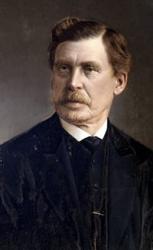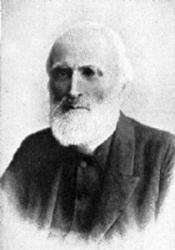Planning worship?
Check out our sister site, ZeteoSearch.org,
for 20+ additional resources related to your search.
- |
User Links
Person Results
John Page Hopps

1834 - 1911 Person Name: John P. Hopps Author of "Father, lead me day by day" in The New Church Hymnal Hopps, John Page, was born in London, Nov. 6, 1834, and educated at the G. Baptist College, Leicester. Commencing public work in 1856, after a brief ministry at Hugglescote and Ibstock, in Leicestershire, he became colleague with George Dawson at the Church of the Saviour, Birmingham. From 1860 to 1876 he ministered to Unitarian congregations at Sheffield, Dukinfield, and Glasgow. Since 1876 he has preached in Leicester. Mr. Hopps has published many books and pamphlets, chiefly volumes of Sermons and Lectures. Most of his smaller works are controversial. In 1863 he commenced a monthly periodical called The Truthseeker. He has compiled the following hymnbooks for Congregational, Mission, or School purposes:—
(1) Hymns for Public Worship and the Home, 1858; (2) Hymns of Faith and Progress, c. 1865; (3) Hymns for Public Worship, 1873; (4) One hundred Hymns for Sunday Schools, 1873; (5) Hymns, Chants and Anthems for Public Worship, 1877; (6) The Children's Hymn Book, 1879; (7) The Young People's Book of Hymns, 1881; (8) and six different editions of Hymns for Special Services (for Sunday afternoon and evening gatherings in the Temperance Hall and Floral Hall, Leicester).
Mr. Hopps has himself written various hymns, some of considerable merit. Several have appeared in Congregational, Baptist, Unitarian and other collections. Among the best known are the following:—
1. Cold and cheerless, dark and drear. Winter.
2. Father, lead me day by day. Child's Prayer for Divine Guidance.
3. Father, let Thy kingdom come. God's Kingdom desired.
4. God bless the little children. Prayer for Children.
5. We praise Thee oft for hours of bliss. The blessings of Sorrow.
These hymns are from his Hymns, Chants, and Anthems, &c. 1877, and the Hymns for Special Services. The most popular is No. 2.
[Rev. W. R .Stevenson, M.A.]
--John Julian, Dictionary of Hymnology (1907)
John Page Hopps
John Berridge

1716 - 1793 Author of "Jesus, cast a look on me!" in Book of Worship with Hymns and Tunes Berridge, John, born at Kingston, Notis, March 1, 1716, and educated at Clare Hall, Cambridge. In 1749 he was ordained as curate to the parish of Stapleford, near Cambridge, and in 1755 he was preferred to the Vicarage of Everton, where he died Jan. 22, 1793. His epitaph, written by himself for his own tombstone (with date of death filled in), is an epitome of his life. It reads:—
" Here lies the remains of John Berridge, late Vicar of Everton, and an itinerate servant of Jesus Christ, who loved his Master and His work; and after running on His errands for many years, was caught up to wait on Him above. Reader! art thou born again? (No salvation without a new birth.) I was born in sin, February, 1716; remained ignorant of my fallen state till 1730; lived proudly on faith and works for salvation till 1754; was admitted to Everton Vicarage, 1755; fled to Jesus for refuge, 1755; fell asleep in Jesus, January 22,1793."
The first collection of Berridge's hymns was published as A Collection of Divine Songs, 1760. This was subsequently suppressed. In 1785 his Sion's Songs; or, Hymns composed for the use of them that love and follow the Lord Jesus Christ in Sincerity were published. The work contains 342 hymns, some of which had previously appeared in the Gospel Magazine (from 1775 to 1777, 20 in all), under the signature of "Old Everton" and others were adapted from C. Wesley. The most popular of these in modern collections are, "Jesus, cast a look on me;" "O happy saints who dwell in light;” and "Since Jesus freely did appear." Concerning his hymns published in 1785, he says in his Preface:—
“Twelve years ago these hymns were composed in a six months' illness, and have since laid neglected by me, often threatened with the fire, but have escaped that martyrdom."
-- John Julian, Dictionary of Hymnology (1907)
==================
Berridge, John, p. 138, i. The 1842 edition of his Sion's Songs has an elaborate preface by J. C. Philpot, the editor. From this collection the following additional hymns are in common use:—
1. I ask my dying Saviour dear. Sealed by Christ.
2. Lord Jesus, Who didst once appear. Holy Matrimony. An altered form of "Since Jesus freely did appear," p. 1059, i.
3. Soon as faith the Lord can see. None but Jesus.
--John Julian, Dictionary of Hymnology, Appendix, Part II (1907)
John Berridge
John Downing Farrer
1829 - 1919 Person Name: John Downing Farrer, 1829 - 1919 Composer of "NEW CALABAR" in The Hymnary of the United Church of Canada Born: Circa February 1829, Lowestoft, Suffolk, England.
Died: Circa February 1919, Christchurch District, Hampshire, England.
Farrer and his wife were living in Lowestoft as of 1881, and Farrer was in Bournemouth in 1901.
--www.hymntime.com/tch/
John Downing Farrer
Johann Scheffler
1624 - 1677 Person Name: J. Scheffler Author of "Earth has nothing sweet or fair" in Hymns of Worship and Service Used Angelus Silesius as a pen name. See also Angelus Silesius, 1624-1677
Johann Scheffler
Annie Wright Marston
1852 - 1937 Person Name: Annie W. Marston Author of "Now the Lord Our Souls Has Fed" in The Cyber Hymnal Marston, Annie Wright, daughter of Dr. C. H. Marston of Devizes, Wiltshire, was born at Uley, Gloucestershire, in 1852. To the 2nd ed. of Hymns of Consecration and Faith, 1890, Miss Marston contributed at the request of Mrs. Evan Hopkins several hymns, of which the following were retained in the new and enlarged edition (the 3rd), 1902, and are in common use:—
1. I thank Thee, Lord, that Thou hast shown. Christ All in All.
2. It shall be now; Lord, from my heart I say it. Surrender to Christ.
3. Lord, I come at last to Thee. Surrender to Christ.
4. Now the Lord our souls has fed. Holy Communion. Also in the Church Missionary Hymn Book, 1899.
5. O Lord, I come to Thee. Christ our strength.
6. This day the Lord has spoken. Dedication of self to God.
All these hymns were written for use at Conventions at Keswick and elsewhere, and are of a simple and devotional character.
--John Julian, Dictionary of Hymnology, New Supplement (1907)
Annie Wright Marston
Fenton J. A. Hort

1828 - 1892 Person Name: Rev. F. J. A. Hort Translator of "Joy! because the circling year" in The Book of Common Praise Hort, Fenton John Anthony, D.D., was born Apr. 23, 1828, and educated at Trinity College, Cambridge, B.A. in 1st class Classical Tripos, 1850, and also in the Moral Science Tripos and the Natural Science Tripos, 1851. He has held several distinguished appointments at his University, has published several learned works, was joint editor with Dr. Westcott of The New Testament in the Original Greek, and sat as one of the Revision Committee of the New Testament. He has translation a few hymns. He died Nov. 30, 1892.
--John Julian, Dictionary of Hymnology, Appendix, Part II (1907)
Fenton J. A. Hort
J. Richardson
Author of "Ry Jehovah Tomponay! Tafavory izahay (We are now meeting, our Lord Jehovah!)" in Protestant Madagascar Hymnal, 2001
J. Richardson
William Edgar Enman
1869 - 1950 Author of "The Nativity of Saint John the Baptist" in The Book of Common Praise Born: April 18, 1869, Charlottetown, Prince Edward Island, Canada.
Died: July 22, 1950, Summerside, Prince Edward Island, Canada.
===================================
Enman, William Edgar. (1869--July 21, 1950, both in Charlottetown, Prince Edward Island, Canada). Anglican. He spent a number of years working in various publishing houses in the U.S., where many of his articles and verses were published, notably in The Living Church, an Episcopal journal in Milwaukee. After returning to his province, he published privately One Hundred Hymns and Sacred Lyrics, about 1945, with an introduction by the Bishop of Nova Scotia. He was an active layman of St. Peter's Cathedral, Charlottetown.
--Hugh D. McKellar, DNAH Archives
William Edgar Enman


 My Starred Hymns
My Starred Hymns

